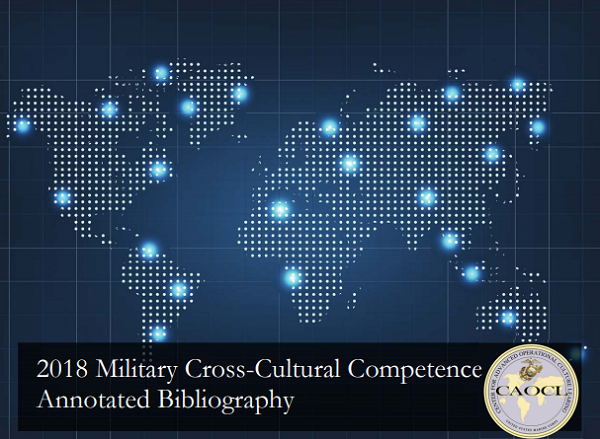Building the Research Respository: CAOCL's 3C Annotated Bibliography
The Marine Corps' Center for Advanced Operational Culture and Learning (CAOCL) recently released their updated Military Cross-Cultural Competence Annotated Bibliography. Compiled by Dr. Lauren Mackenzie, Eric Gauldin, and Erika Tarzi, this bibliography is an update of the 2016 document. The authors write that this version addresses "the larger developments that have occurred within the 3C community of interest [and] its relevance to the changing nature of global conflict."
You can find some of the research listed right here on CultureReady, under the Research section. These include:
- [48] Fosher, K., Mackenzie, L., Tarzi, E., Post, K., & Gauldin, E. (2017). Culture general guidebook for the military professional. Quantico, VA: Center for Advanced Operational Culture Learning. https://www.usmcu.edu/culture-general-guidebook.
Designed to serve as resource for those developing and delivering culture instruction as well as for the military practitioner, the guidebook provides concepts and skills that are applicable regardless of location. The authors took both a multidisciplinary (anthropology, cultural geography, intercultural communication, etc.) and collaborative (across the services) approach to ensure the content is rooted in the best available contemporary science – focusing on culture as how people live rather than a set of structures that people live in. The guidebook is organized into three main sections: (1) an introduction to and historical overview of the Department of Defense’s cultural capability, (2) culture general concepts, and (3) culture general skills (for both thinking and interacting), followed by several appendices that offer the reader a variety of references, recommended resources, and teaching tools.
- [139] Rasmussen, L. J., Sieck, W. R., Duran, J. L. (2016). A model of culture-general competence for education and training: Validation across services and key specialties. Yellow Springs, OH: Global Cognition.
Preparing people for the cultural aspect of their jobs is a challenge for leaders. A key difficulty for military leaders is that their people may ultimately go anywhere. US personnel have to be ready to engage and work with people from countless cultures and to get up to speed quickly in new areas of operations. They need a set of cultural skills that apply no matter where they hit the ground. The authors refer to this set of skills as culture-general competence. The aim of the current study was to further test a model of culture-general competence referred to as Adaptive Readiness for Culture (ARC). It is general in the sense that it applies across all regions of interest. The skills that comprise ARC were identified in an earlier study of Marine Corps and Army service members who had worked in multiple cultures. This unique aspect of the study was essential to tease out general skills from specific area knowledge. The current study extended the sample to determine how well the model applies across DoD and the total force.
- [142] Rasmussen, L. J., Sieck, W. R., Crandall, B., Simpkins, B., & Smith, J. (2013). Data collection and analysis for a cross-cultural competence model (Technical Report No. DLO GS-10F-0298K). Fairborn, OH: Klein Associates Division of Applied Research Associates, Inc.
The purpose of this project was to develop a cross-cultural competence (3C) model for the General Purpose Forces (GPF) in the U.S. military, based on data from operators with experience in various cross-cultural environments. This model prioritizes cross-cultural competencies that are the most important (i.e., core). Using the model, the authors describe how competencies organize in relation to each other and to mission-critical performance and specify how the knowledge, skills, and abilities related to 3C are enacted in specific ways. The authors interviewed a total of 26 officers and senior enlisted personnel from the Marine Corps, Army, and Air Force. All of the interviewees had been deployed at least twice, and 75% had been deployed three or more times to at least two different regions in the world. All of the interviewees also had recent deployments serving in billets that required extensive interaction and contact with members of local populations and had received some form of peer or supervisory nomination indicating they were especially adept within the role or function they served in general intercultural interactions. Conclusions yielded from this study include interviewees observing that 1) cultural rules differ from region to region, 2) cultures change over time, even if you deploy to the same place you went before, 3) people make exceptions to their cultural rules because they may know how Americans operate, and 4) individual members of a culture don’t always follow their own cultural rules.
Do you have research you think would benefit the wider 3C community? Are there papers listed in the annotated bibliography that you think should be hosted on CultureReady but aren't yet? Help us continue to build the research repository for cross-cultural competence by contacting us or submitting your own research.
To learn more about CAOCL, you can visit their CAC-enabled page on MilSuite.
